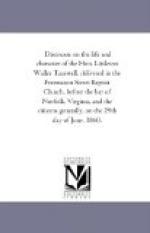The keen eye of John Marshall saw at once the caste of Tazewell’s mind, and pronounced him an extraordinary young man. And I may say here, that the subdued manner and tone in which Mr. Tazewell spoke of Judge Marshall would convey a stronger impression of the character of the judge than any mere words of eulogy could well do. For his person and abilities he cherished the most profound respect and admiration. Even of the Life of Washington, which it was the fashion of the young democrats of my day to laugh at for the grammatical blunders and inverted English that marred the first edition of that work, Tazewell, who, though never eminent in elegant composition, always wrote good English, and saw all the faults of the work, still put a high value upon it as I certainly now do myself; and within a year of his death, when he was told an author was about to publish a history of the administration of Washington, he observed: “What can he tell that Judge Marshall has not told a great deal better already?” Yet, from the beginning of Mr. Tazewell’s career to its close, they differed from each other on most of the great constitutional questions of their times. Candor compels me to say, however, that the decisions of the judge in the case of Maculloch against the Bank of Maryland, and in the case of Cohens against the State of Virginia, greatly disappointed him; and after their promulgation, though he still entertained feelings of high respect for his abilities, he would hardly have offered in honor of the judge that famous sentiment which he proposed at the Decatur dinner, and which elicited so much remark at the time.
But it was probably in his association with Chancellor Wythe, who loved and petted the promising boy, the son of his old neighbor in Williamsburg, whom he had taken from the dying bedside of another old neighbor, that Tazewell formed his taste for profound research, and his determination to master the law as a science. Wythe, above all our early statesmen, was deeply learned in the law, had traced all its doctrines to their fountain-heads, delighted in the year-books from doomsday down; had Glanville, Bracton, Britton, and Fleta bound in collects; had all the British statutes at full length, and was writing elaborate decisions every day, in which, to the amazement of county court lawyers, Horace and Aulus Gellius were sometimes quoted as authorities. And it is worthy of note, that Tazewell, affectionately attached as he was to Wythe, did not adopt his prejudices or antipathies, nor those peculiarities of punctuation and the disuse of capital letters at the beginning of sentences, which even Mr. Jefferson copied from his old master, but cherished a proper and becoming admiration for Pendleton, as will presently appear, between whom and Wythe there had been a life-long rivalry, and more recently some sharp judicial passages at arms, which we could wish were blotted out forever, but which, embodied in ever-during type, posterity




